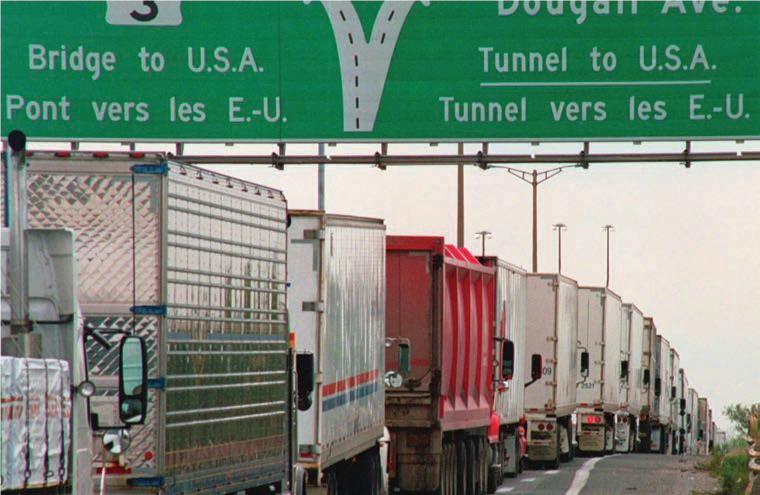By Brice Wallace
Several new voices have joined the chorus wanting the North American Free Trade Agreement (NAFTA) to remain in place.
The Utah Farm Bureau last week said total U.S. withdrawal from NAFTA would weaken the nation’s farm economy. Speaking recently in Salt Lake City, Dan North, chief economist for North America at Euler Hermes, said 14 million U.S. jobs tied to the agreement are in jeopardy.
{mprestriction ids="1,3"}
And a new report from Business Roundtable indicates that withdrawal from NAFTA would have widespread economic impacts in Utah, including the elimination of 18,051 jobs within a year.
Last year, leaders of World Trade Center Utah and the Salt Lake Chamber said that provisions of NAFTA could be tweaked but rejected the idea of complete withdrawal.
NAFTA took effect in 1994 and established a free-trade zone involving the U.S., Canada and Mexico. President Trump has threatened to have the U.S. withdraw from the pact or get major changes to benefit the U.S.’s position.
Statistics reported by World Trade Center Utah show that in 2016, Canada and Mexico were among the top five destinations for Utah exports, behind only the United Kingdom and Hong Kong. Utah exports to Canada had a total value of $1.32 billion and exports to Mexico totaled about $740 million that year.
Speaking at VentureCapital.org’s Investors Choice Conference in Salt Lake City, North noted that trade with Mexico and Canada supports 14 million U.S. jobs.
“Ten percent of the jobs in this country are based on NAFTA trade, and I really hope that that NAFTA agreement continues on,” North said. “It would be, I think, a pretty big impact on us. It would be devastating to Mexico and Canada. Sure, we could make tweaks around the edges, but I really want that to keep going.”
North said it is true that American jobs are destroyed whenever a U.S. company moves a plant to Mexico, but the net effect is more than offset by jobs created when U.S. companies are opened to new markets, and consumers ultimately see better prices and choices for goods, he said.
The economic analysis prepared for Business Roundtable by Trade Partnership Worldwide LLC indicates that terminating NAFTA and re-imposing tariffs on exports and imports eliminated by the agreement would result in the loss of 1.8 million U.S. jobs.
The 50-state analysis indicates that Utah exports to Canada and Mexico would drop 17 percent if the U.S. withdraws from NAFTA. It projects a $271 million decline in Utah exports to Canada and a $216 million drop in Utah exports to Mexico.
“By raising the costs of Utah exports and imports, a U.S. withdrawal from NAFTA would make Utah businesses and farmers less competitive, resulting in losses of jobs and production in the state and exports from the state to Canada and Mexico,” the report states.
NAFTA termination would cause Utah business production to decline $1.1 billion, the report states. Vulnerable Utah export sectors, it says, include auto parts, $90 million; travel services, $33 million; miscellaneous foods, $31 million; meat products, $27 million; nonferrous metal products, $20 million; and motor vehicle bodies and trailers, $20 million.
Vulnerable Utah export products include vehicle safety airbags, $20 million; food preparations, $17 million; and textile fabrics impregnated with plastics, $8.4 million.
Nationally, in addition to the 1.8 million jobs, a NAFTA withdrawal would result in a 17 percent drop in exports to Canada and Mexico and a $119 billion decline in production, according to the report. U.S. exports to Canada would slip by $48.3 billion and to Mexico by $42.4 billion.
Vulnerable export sectors nationally include auto parts, motor vehicles, travel services, meat products, oilseeds and grains, and computer equipment. Vulnerable export products are passenger vehicles, corn and soybeans.
The Business Roundtable report is available at BRT.org/nafta-facts.
Meanwhile, the Utah Farm Bureau issued a list of “Issues to Watch For in 2018,” including trade matters among national issues.
“As modernization of the North American Free Trade Agreement, or NAFTA 2.0, continues, concern from the agricultural community over a potential NAFTA withdrawal has intensified,” it said. “NAFTA supporters point toward the tens of billions of dollars in U.S. agricultural exports delivered to our NAFTA partners each year or point out that exports to Mexico and Canada represent 30 percent of all U.S. agricultural exports. Put simply, Mexico and Canada are among our top three export markets.
“Total withdrawal from NAFTA would make U.S. farmers and ranchers less competitive in our top export markets — and could result in billions of dollars of agricultural products accumulating in inventories — further weakening the U.S. farm economy. The integration of the North American agricultural market that has occurred over the last quarter century is at risk.”
Last September, the Salt Lake Chamber has joined forces with visiting counterparts from Mexico to sign an agreement to show support for protecting existing free trade agreements, including NAFTA, between the U.S. and Mexico. Speakers said NAFTA needs to be updated but should remain in place.
Last March, Derek Miller, president and chief executive officer of the World Trade Center Utah, told a crowd in Salt Lake City that he too liked the idea of altering — but keeping — NAFTA. One reason he cited was that Utah saw exports to Mexico rise from $250 million to $741 million over a decade.
{/mprestriction}








